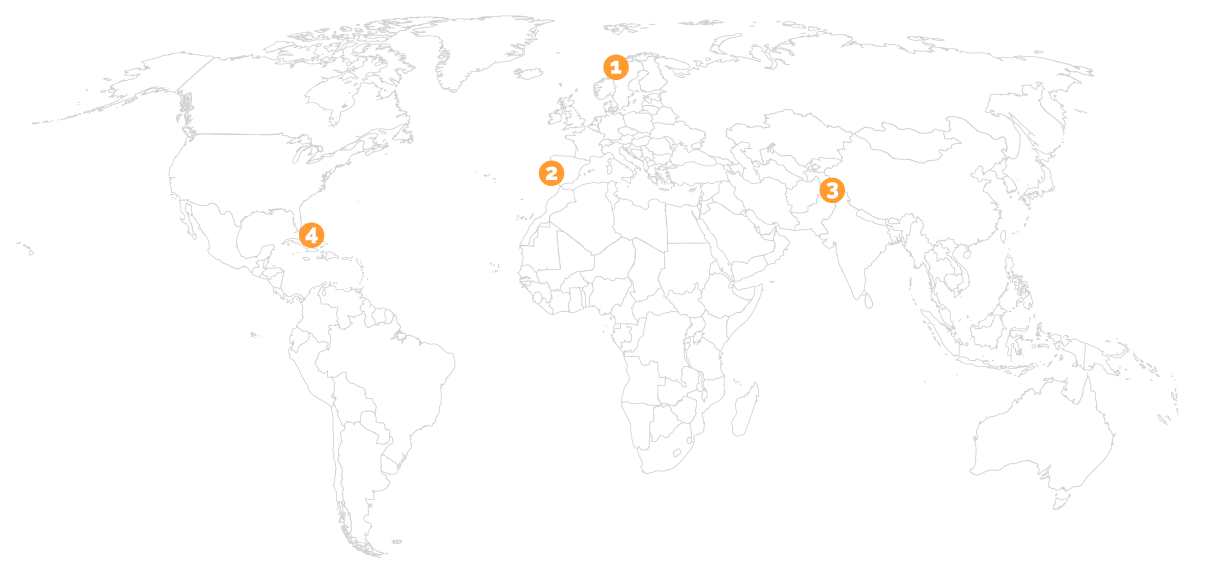STAKEHOLDER CO-DEVELOPMENT PROCESS
The PROVIDE Climate Services Dashboard will be co-developed together with practitioners, scientists, litigation experts, business, civil society and other potential users. We want to advance collaboration between potential users of climate impact information, researchers and providers of climate services to develop stakeholder-oriented climate science and a community around overshoot issues in adaptation planning. Doing so, we aim to increase the ownership and capacities of decision makers and regional/urban planners to customise and use the PROVIDE tools (e.g. the Climate Service dashboard) and methods for adaptation planning.
Up to date Climate Services focusing on threshold exceeding risks
Are you looking for reliable, up to date climate impact information for your region? Do you need high resolution modelling for your city? Are you interested in the impacts of overshoot scenarios and would you like to overshoot proof your adaptation measures?
Then you should join our group of global and regional stakeholders. We provide impact information for policy relevant scenarios on global, national, regional and city level. Furthermore, we will co-develop an interactive webtool (the PROVIDE Climate Services Dashboard) together with you to provide impact information, and to explore scenarios that do not exceed certain thresholds. The Climate Service Dashboard will be available open access to all stakeholders, who are responsible for planning, using and/or improving overshoot adaptation capacities.
A first set of regional workshops in the Iconic Regions was conducted in March/April 2022, where input on the concept of the Climate Services Dashboard was gathered. On European level, we are looking for stakeholders to join us in overshoot proofing two EU adaptation strategies. Webinars and workshops are planned to start in late 2022 or early 2023. If you are interested in becoming a stakeholder, please share your information here.
Members of the Stakeholder Advisory Board:
David Carlin
UNEP FI (Geneva, Switzerland)
Dennis van Berkel
International Cryosphere Climate Initiative (Lund, Sweden)
Frans Berkhout
King’s College London (London, United Kingdom)
Hans-Martin Füssel
EEA (Copenhagen, Denmark)
Marcia D. Musgrove
The Nature Conservancy (Nassau, New Providence, The Bahamas)
Kaisa Kosonen
Greenpeace (Helsinki, Finland)
Pam Pearson
International Cryosphere Climate Initiative (Lund, Sweden)
Xun Sun
Global Center on Adaptation (Rotterdam, The Netherlands)
Sign up as a
Stakeholder
4 ICONIC Regions and Cities
PROVIDE assesses regional and local impacts of overshoot pathways and required adaptation responses in four Iconic Regions (IR), including a focus on selected urban environments within those regions. These are places where physical risks overlay with specific socio-economic vulnerabilities and were selected to serve as Iconic Cities (IC) where the PROVIDE Overshoot Proofing Methodology can be co-developed with local and regional stakeholders. They will provide entry-points for raising awareness about the need for enhanced adaptation action under overshoot scenarios and offer a practical testbed for generalisable urban planning approaches.

IR1
IR2
IR3
IR4
IR1: Arctic Fennoscandia »
City of Bodø, Norway
IR2: Iberian Mediterranean »
Lisbon Metropolitan Area, Portugal
The Iberian Mediterranean is a region with a wide range of climate vulnerabilities related to extreme temperatures, droughts and water scarcity, forest fires, agriculture yield and species loss. Lisbon and its wider Metropolitan Area is a typical Mediterranean coastal city in terms of vulnerability to extreme climate events, but its location by the Atlantic Ocean adds further exposure to climate hazards. These include growing concerns related to sea level rise, storm surge, Atlantic hurricanes and catastrophic forest fires.
IR3: Indus Basin »
City of Islamabad, Pakistan
The whole Indus River Basin is characterised by high socio-economic vulnerability as well as exposure to key impacts such as extreme weather events (e.g. heat, flood and drought), economic damages and crop failure. Pakistan’s capital Islamabad is projected to grow considerably over the next decades and is vulnerable to risks such as water shortages, urban flooding and heat stress.
IR4: Caribbean Small Islands »
City of Nassau, The Bahamas
The Bahamas has high levels of exposure to climate hazards, including increased intensity of tropical cyclones, more intense and extended marine heat waves, rising sea levels, extreme wave heights, increased rainfall intensity and prolonged periods of drought. The population of 400,000 (60% resides in Nassau) are spread over approximately 20 islands where limited resources and concentration of communities along the coasts makes adaptation especially challenging.
Case study expansion: Berlin-Brandenburg »
Berlin, Germany
As heat is a concern for many global urban areas, the PROVIDE case study methodology offers opportunities to other cities and regions. Berlin-Brandenburg initiated to follow PROVIDE’s case study methodology starting in December 2022, with a 12-month work plan. As such, the municipality receives high-resolution heat stress modelling (1 x 1 meter), stakeholder engagement to define areas and indicators of interest, and predictive heat mapping. Results support best urban climate adaptation decisions through use of multiple climate scenarios to illustrate impact of different building types on Berlin heat stress. Outcomes of the Berlin-Brandenburg study will be incorporated into the final version of the Climate Risk Dashboard.
